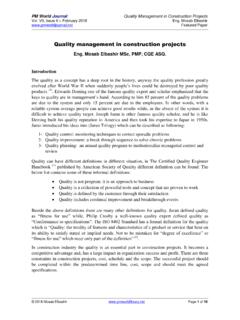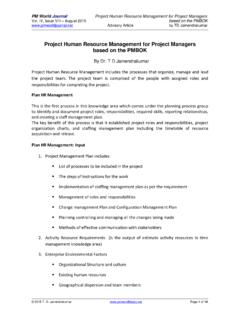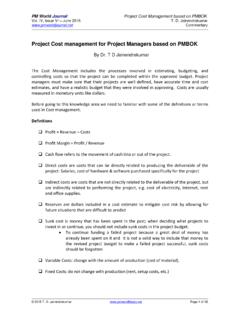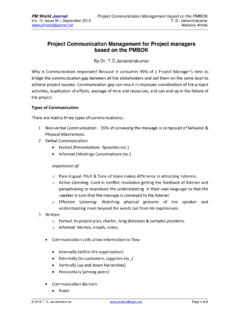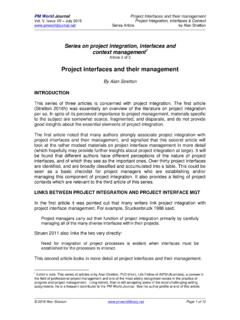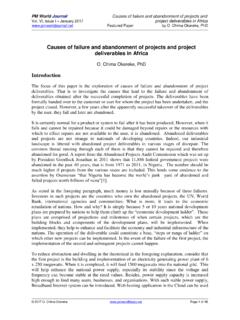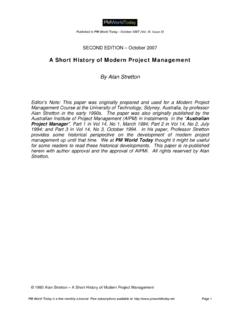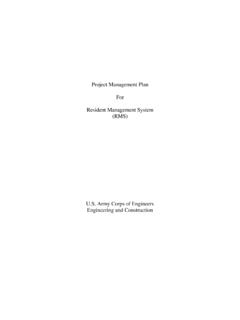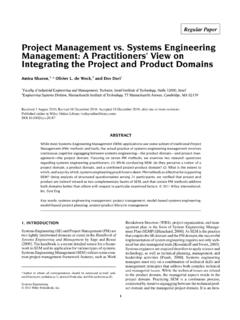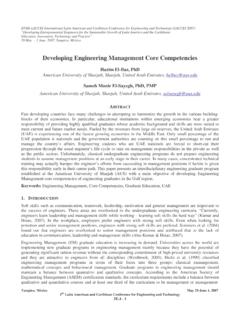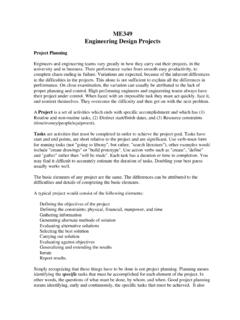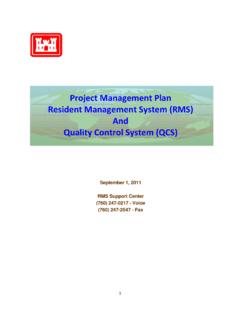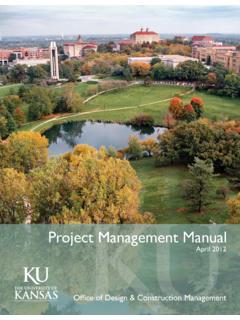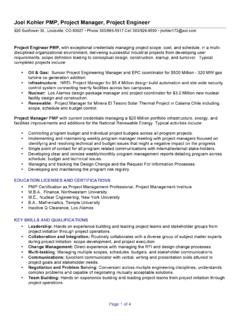Transcription of Comparing project management and chemical engineering
1 PM World Journal project management & chemical engineering Vol. V, Issue III March 2016 Raju Rao Featured Paper 2016 Raju Rao Page 1 of 14 Comparing project management and chemical engineering - Some Observations Raju Rao, PMP, SCPM, OPM3 Certified Professional Abstract chemical engineering is now a more century old profession and history has shown that it had to surmount many challenges before being accepted widely. project management as a practice started off much later seems to follow a similar trajectory. In this paper a comparison is made of the evolution of the two disciplines, understanding the areas of commonality and some concepts that project management can follow in its practice. One such practice is the concept of unit operations which was a principal reason for the widespread use of chemical engineering . Similar to this, it is propounded that we can use the concept of a universal process in project management which will enable it to be applied as a generic methodology and will go a long way in implementation of any project irrespective of the domain, industry or size.
2 Historical comparison chemical engineering The development of chemical engineering as a discipline and practice can be observed through six periods. (1780 -1880 ) The initial years: Saw the emergence of a substantial chemical industry and the new science of chemistry.(6) (1880 -1910) Origins of chemical engineering : A Society of chemical engineers was first started in the UK and formal educational courses first offered by Universities in the period 1887 /1888. George Davis first postulates in a series of lectures recognizes that chemical processes could be regarded as combinations or sequences of a comparatively small number of procedures .Before 1905 many universities in the US were offering such courses and this matched the growth of chemical industry. In 1908 the American Institute of chemical Engineers was formed. (6) (1910- 1945) Defining a new profession: Major focus was on education.
3 Arthur D Little first coined the term unit operations in 1915. chemical engineering PM World Journal project management & chemical engineering Vol. V, Issue III March 2016 Raju Rao Featured Paper 2016 Raju Rao Page 2 of 14 courses were started in various institutions in the US, UK, South Africa, India and Japan. During this period various books were published most notable being Principles of chemical engineering , Perry s chemical Engineers Handbook and Chemische Ingenieur Technik.(6) (1945-1970) Sustained Growth: Substantial spreading of education and awareness around the world occurred. Emergence of chemical engineering Science movement .Introduction of principles of transport phenomena and mathematical understanding of chemical engineering . Start of interest in Bio- chemical engineering .(6) (1970-1995) New challenges: Stagnation in growth due to less product development form the sixties, energy prices and safety concerns and pollution control issues became threats to the growth of chemical engineering .
4 (6) (1995-present) A Paradigm shift? The London communiqu signed by eighteen societies of professional chemical engineers around the world review the role of chemical engineers and considered a more holistic approach which included quality of life, employment, economic and social development, protection of the environment and encompassed the essence of sustainable development. (6) The future looks at various areas of research: energy and natural resources processing, biochemical and biomedical engineering ,(1) advanced engineering materials, electronic, photonic and recording materials & devices, environmental protection, safety and hazardous materials, cross-cutting surface and interfacial engineering and computer assisted process control and process engineering . chemical engineering practice and profession can be expected to move beyond the concept of unit operations, reaction engineering or even a multi-disciplinary approach to solve problems.
5 Business models could be moving from a diversified chemical company to a provider focusing on special products through Custom manufacturing and Exclusive syntheses focused on the customer. (2) Product / project engineering & management will become common place as compared to large scale continuous processing. The emphasis will be on organizations to focus on their core competencies and leveraging their knowledge and expertise through technology, knowledge management , partnerships and alliances. The new chemical engineering profession will demand more generalists and fewer specialists, they will have an extended reach in their professional community, will form matrix mindsets and have a cross functional team based approach. (10) PM World Journal project management & chemical engineering Vol. V, Issue III March 2016 Raju Rao Featured Paper 2016 Raju Rao Page 3 of 14 Table 1 Milestones chemical engineering project management Historically, the major events that have taken place in practice of project management can be viewed in terms of the following periods.
6 (11) The 1950s Bechtel first used the term project Manager in their international work beginning in the 1950's. Two pioneering techniques for project planning and monitoring, namely Critical Path Method (CPM), and project Evaluation Review Technique (PERT), were developed in the USA, but quite independently, in the late 1950s. There emerged a perceived need to appoint a project Manager (whether an individual or an organization) to take full and undivided responsibility for achieving the project objectives. The primary technical development in project management in this period was in network techniques, which were initially concerned with planning and control of project times with project time management . Dates Milestones Development of chemical engineering 1880 George Davis, a Britain, founded the Society for chemical Engineers, which failed.
7 1887 George Davis presented a series of 12 lectures on chemical engineering at Manchester Technical School. 1888 The first chemical engineering curriculum ever began at the Massachusetts Institute of Technology (MIT). 1901-1904 George Davis wrote a "Handbook of chemical engineering ," which had over 1000 pages about unit operations, now considered to be part of the base of all modern-day chemical engineering . 1915 Arthur D Little recognized that pulverizing ,dyeing , drying ,crystallizing , filtering ,evaporation ,electrolyzing and other assorted processes which were used in different industries were essentially common and he gave the name Unit Operations to such processes. 1923 William , Warren K. Lewis and William H. McAdams wrote the book The Principles of chemical engineering 1932 The American Institute of chemical Engineers (AIChE) was formed. 1940s chemical engineering Science movement 1940sto 1950s Start of Biochemical engineering practice and educational programs 1950s Mathematical understanding of chemical engineering - N R Amundson 1950s Start of discipline of chemical reaction engineering Shell research centre & University of Delft, Netherlands 1959 John Glover, who designed the first mass-transfer tower, is often considered to be the first chemical Engineer.
8 1960s Process systems engineering movement 1960 Publication of Book on Transport Phenomena by Bird Stewart and Lightfoot 1997 The London communiqu signed by eighteen societies of professional chemical engineers around the world PM World Journal project management & chemical engineering Vol. V, Issue III March 2016 Raju Rao Featured Paper 2016 Raju Rao Page 4 of 14 The 1960s project cost management (and its associated project resource scheduling), was added to project time management as a distinctive project management technique, and integration of the two was proceeding. The net effect of a decade of focus on network techniques was that project management was closely identified with, and for some was synonymous with, the use of network techniques for project planning, scheduling and controlling. project management was still primarily identified with the construction, defence and aerospace industries.
9 Professional project management bodies were formed independently in Europe and North America. The 1970s The spread of project management applications from construction, defence and aerospace happened in virtually every industry. The emergence and/or refinement of a much wider range of tools and techniques, including WBS, responsibility assignment matrices, and earned value methods were significant developments. Matrix forms of organization became commonplace. management of conflict on projects became an area of concern. There was an increasing recognition of the distinctive nature of project management as a vocation/profession. The 1980s and early 1990s There was increased efforts to represent project management as a structured discipline and approach PMI's PMBOK (9).The management of project scope, quality, risk, human resources, communications and contract/procurement to time and cost were added as significant project management functions.
10 There was an increased emphasis on managing the front end of projects, including clients needs determination, feasibility studies, value analysis, risk management , and project startup generally. A more balanced approach was considered to managing the entire project life cycle. There was increased emphasis on product verses project life cycle costing. There was an increased focus on managing factors external to the project , particularly stakeholders and other interested parties, and physical environmental constraints. project management came to be perceived as an appropriate methodology for responding to, and initiating change. The development of certification/registration programs for project managers received more attention. 1990s to Now Various trends can be observed in the environment for example global competition, rapid technological change, product obsolescence, organization downsizing process improvement, e business empowerment quality / continuous improvement, measurement and inter-organizational systems.


